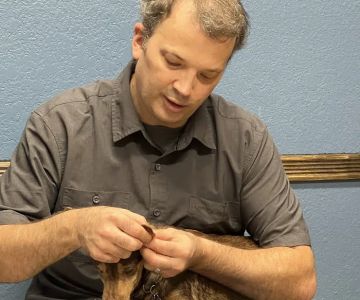What Type of Veterinarian Should I Be? Take the Quiz to Find Out!
- Understanding Veterinary Careers
- Exploring Different Veterinary Specialties
- How to Choose the Right Veterinary Path for You
- Real-Life Examples: Different Types of Veterinarians
- Take the Quiz: What Type of Veterinarian Should You Be?
If you’ve ever wondered “What type of veterinarian should I be?” then you’re not alone. Many aspiring veterinarians find themselves grappling with this very question when choosing their career path. The veterinary field is incredibly diverse, and understanding the many specialties available can help you find the perfect fit for your skills, interests, and goals. In this article, I’ll help you explore the different types of veterinarians, share some real-life examples, and guide you in choosing the right veterinary specialty for your future career. Plus, I’ll introduce a fun quiz to help you discover what type of veterinarian you should be!
1. Understanding Veterinary Careers
The veterinary field offers a wide range of career options. Whether you’re passionate about working with pets, livestock, or even exotic animals, the options are vast. Veterinary doctors (veterinarians) are professionals who are responsible for diagnosing, treating, and preventing diseases in animals. However, beyond general practice, there are many specialized areas within veterinary care that allow professionals to focus on specific types of animals, medical conditions, or areas of research.
For instance, some veterinarians work in general practice, providing healthcare for pets like dogs, cats, and small mammals. Others might choose to work in specialty fields such as surgery, cardiology, dermatology, or oncology. There are also opportunities in fields like wildlife conservation, zoo medicine, and even government agencies working to control animal diseases that could impact human health.
Choosing the right veterinary career path requires a deep understanding of the various options available and how they align with your interests and long-term goals. Whether you prefer working with animals in a hands-on clinical environment or prefer the research side of veterinary science, there's a veterinary career for you!
2. Exploring Different Veterinary Specialties
Veterinary medicine is not a one-size-fits-all profession. There are several specialties within the field that allow veterinarians to focus on particular areas of animal care. These specialties often require additional training and certification, but they offer exciting career opportunities. Here are some of the most common veterinary specialties:
- Small Animal Practice: This is the most common type of veterinary practice, where veterinarians focus on the care of pets like dogs, cats, and rabbits. This specialty covers routine checkups, vaccinations, emergency care, and general health maintenance.
- Large Animal Practice: Veterinarians in this specialty focus on treating larger animals, such as horses, cows, and other livestock. These professionals work on farms, ranches, and agricultural settings, and their tasks include everything from preventive care to surgery and emergency treatment.
- Exotic Animal Medicine: Exotic animal veterinarians specialize in the care of non-traditional pets, including birds, reptiles, and small mammals. This can be a rewarding career path for those who love working with a wide variety of animals.
- Wildlife Medicine: Veterinarians specializing in wildlife medicine focus on the health and conservation of wild animals. They often work in national parks, wildlife reserves, or research labs to treat injured animals and contribute to environmental conservation efforts.
- Veterinary Surgery: If you have a passion for surgery, this specialty focuses on performing complex medical procedures on animals. These veterinarians work with animal hospitals or specialized surgical clinics to address a wide range of conditions that require surgical intervention.
- Veterinary Dermatology: For those interested in skin conditions, this specialty focuses on diagnosing and treating dermatological issues in animals, such as allergies, infections, and other skin-related disorders.
3. How to Choose the Right Veterinary Path for You
Choosing the right type of veterinarian to become can be a challenging decision, but it’s an important one. Here are some key factors to consider when making your decision:
- Interest and Passion: Think about the types of animals you enjoy working with most. Are you drawn to small pets like cats and dogs, or are you more interested in large animals like horses and cattle? Your interests will play a big role in your job satisfaction.
- Skills and Strengths: Certain veterinary specialties require specific skills. For example, if you’re particularly good with your hands and have an interest in surgery, veterinary surgery might be the right fit for you. If you enjoy research and diagnostics, you might consider pathology or clinical pathology.
- Job Environment: Think about where you want to work. Do you envision yourself in a small, private practice, or would you prefer a large hospital, a wildlife conservation area, or a research lab? Your work environment will greatly influence your day-to-day activities.
- Work-Life Balance: Some veterinary specialties, especially those in emergency care or large animal practice, can require irregular hours and long shifts. Consider how much flexibility you want in your schedule.
4. Real-Life Examples: Different Types of Veterinarians
To get a better sense of what being a veterinarian in different specialties is really like, let’s take a look at a few real-life examples:
Dr. Lisa, a small animal veterinarian, spends her days in a bustling clinic seeing patients ranging from puppies and kittens to geriatric cats. Her work involves everything from routine checkups to emergency surgeries. While the work can be demanding, Dr. Lisa loves the direct relationship she has with pet owners and the opportunity to make a difference in the lives of animals.
On the other hand, Dr. John specializes in large animal practice and works mainly with horses and cattle. His typical day involves traveling to farms and ranches, providing preventive care, and treating injuries. He finds great fulfillment in working in the field, but the job requires a lot of physical work and long hours.
Finally, Dr. Emily is a wildlife veterinarian who works with endangered species. Her role involves researching animal behavior, helping to conserve endangered species, and providing medical treatment to wildlife in their natural habitat. The job requires travel to remote locations, but it’s highly rewarding to see the impact she makes on animal conservation efforts.
5. Take the Quiz: What Type of Veterinarian Should You Be?
Still unsure which veterinary path to take? Take our fun and informative quiz to discover which type of veterinarian aligns best with your skills, interests, and career aspirations. This quiz will guide you through a series of questions about your preferences and help match you with the veterinary specialty that could be your perfect fit.
To get started, simply answer a few questions, and you’ll receive personalized recommendations to help you choose your ideal veterinary path. Whether you’re considering small animal practice, large animal care, or even wildlife conservation, this quiz will help you get one step closer to your dream job in the veterinary field.











